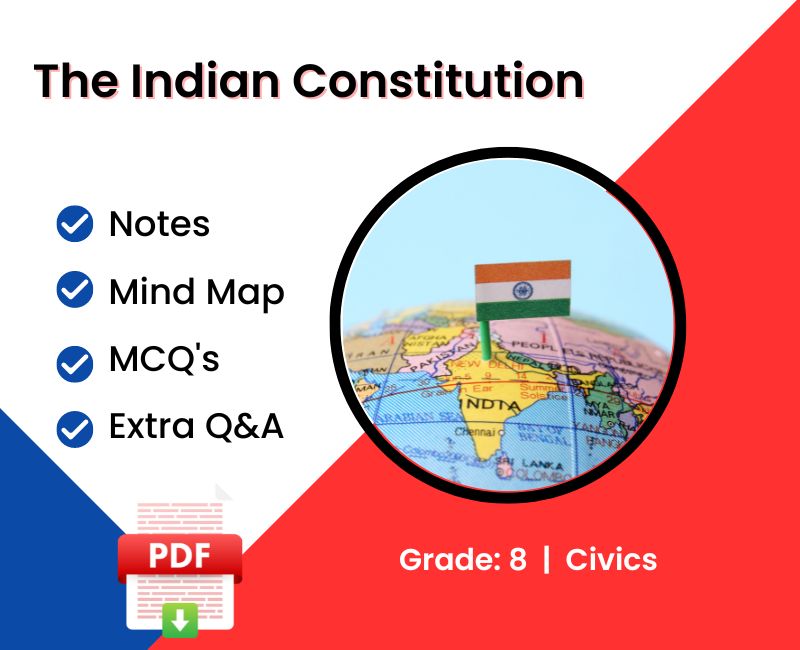The Indian Constitution Class 8: Comprehensive Notes, Mind Map, and Extra Q&A
If you're a Class 8 student studying civics, you'll likely be learning about the Indian Constitution in Chapter 1 of your NCERT textbook. To help you excel in your studies, we've put together an all-in-one resource that includes notes, a mind map, and extra Q&A to enhance your understanding of this important topic.
Introduction to the Indian Constitution.
The Indian Constitution is the supreme law of India, adopted on November 26, 1949, and came into effect on January 26, 1950. It is the longest written constitution in the world, consisting of a preamble, 22 parts, and 395 articles. The Constitution lays down the framework for the governance of India, defining the fundamental political principles, establishing the structure, procedures, powers, and duties of government institutions, and setting out the fundamental rights, directive principles, and duties of citizens. Understanding the Indian Constitution is essential for every citizen of India, and particularly important for students of civics.
Key features of the Indian Constitution.
The Indian Constitution is a comprehensive document that outlines the framework for the governance of India. Some of its key features include a preamble that outlines the fundamental principles of the Constitution, a federal system of government that divides power between the central government and the states, a parliamentary system of government that includes a President, Prime Minister, and Council of Ministers, and a system of checks and balances that ensures that no one branch of government has too much power. Additionally, the Constitution includes provisions for fundamental rights, directive principles, and duties of citizens, as well as provisions for the amendment of the Constitution itself.
Preamble of the Indian Constitution.
The Preamble of the Indian Constitution is a brief introductory statement that outlines the fundamental principles and values upon which the Constitution is based. It begins with the phrase "We, the people of India," emphasizing the democratic nature of the Constitution and the fact that it is created by and for the people. The Preamble also outlines the objectives of the Constitution, including justice, liberty, equality, and fraternity, and emphasizes the importance of a secular and socialist society. Overall, the Preamble serves as a guiding principle for the interpretation and implementation of the Constitution.
Fundamental Rights and Duties.
The Indian Constitution guarantees fundamental rights to all citizens, including the right to equality, freedom of speech and expression, freedom of religion, and the right to life and personal liberty. These rights are essential for the protection and well-being of individuals and are enforceable by law. Along with fundamental rights, the Constitution also outlines fundamental duties that citizens are expected to fulfill, such as respecting the Constitution and national symbols, promoting harmony and the spirit of common brotherhood, and protecting the natural environment. These duties are important for the maintenance of a healthy and democratic society.
Directive Principles of State Policy.
The Directive Principles of State Policy are a set of guidelines and principles that the government is expected to follow while making laws and policies. These principles are not enforceable by law, but they are fundamental to the governance of the country. The Directive Principles cover a wide range of issues, including social welfare, economic development, and international relations. Some of the key principles include promoting the welfare of the people, securing social justice, and protecting the environment. The Directive Principles are an important part of the Indian Constitution and reflect the country's commitment to building a just and equitable society.
Diving into Class 8 Civics Chapter 1 MCQ is an enriching journey into the profound world of the Indian Constitution. A vital subject, the Indian Constitution class 8 introduces students to the underlying principles that guide our democratic nation. It's the perfect opportunity to understand the key features of the Indian constitution class 8, a document that beautifully encapsulates the spirit of India and its diversity. It was carefully crafted under the leadership of Dr. B.R. Ambedkar, the Father of the Indian Constitution.
Understanding the Indian Constitution is crucial, especially when tackling Class 8 Civics Chapter 1 MCQ. Students can access the Indian Constitution Class 8 MCQ with answers, further supplemented by the Indian Constitution Class 8 solutions to grasp the essential details better. Moreover, to ensure a comprehensive understanding, students can utilize resources like the Indian Constitution Class 8 NCERT PDF and the Indian Constitution Class 8 PDF notes.
The Indian Constitution is characterized by a set of unique features. When tasked to write the main features of Indian Constitution Class 8 or explain the key features of the Indian constitution class 8, one must remember to mention the Fundamental Rights, Directive Principles of State Policy, Parliamentary System, Independent Judiciary, among others. These are some of the hallmarks that make our Constitution a living document, ensuring its relevance even today. An interesting way to learn about these features would be to use the Indian Constitution Class 8 Mind Map.
Moreover, the Preamble of the Indian Constitution, a component that students must be adept at writing for Class 8, serves as the guiding light of our nation, outlining the fundamental objectives of justice, liberty, equality, and fraternity. The Indian Constitution also places significant emphasis on secularism, protecting minority rights and ensuring a harmonious coexistence among diverse religious and ethnic groups.
Preparing for the Indian Constitution Class 8 quiz or the Indian Constitution mock test can seem daunting, but not when you have the Indian Constitution Class 8 NCERT as your companion. Along with this, the Indian Constitution Class 8 notes study rankers offer concise and simplified explanations of complex topics. For learners seeking an added challenge, the Indian Constitution Class 8 fill in the blanks and the Indian Constitution Class 8 short questions and answers provide an excellent platform to test knowledge.
Apart from English, resources are also available for different languages like Hindi, enhancing accessibility. For instance, the Indian Constitution Class 8 summary in Hindi helps students who are more comfortable in the language. Students can also avail of the Indian Constitution Class 8 PPT download to understand the concepts more visually.
Lastly, the importance of practicing with MCQs can't be overstated. Whether it's MCQ on the Constitution, Fundamental Rights MCQ, or Indian Constitution MCQ, these formats instill a deeper understanding of the topic and encourage active learning. The Class 8 Civics Chapter 1 extra questions and answers MCQ or the Indian Constitution questions and answers will surely aid students in their journey to master the essence of the Indian Constitution.
Therefore, Class 8 Civics Chapter 1 MCQ is not just about answering questions correctly but is an enriching exploration of the Indian Constitution, offering students a detailed understanding of the framework that has been the backbone of our nation since Independence.






